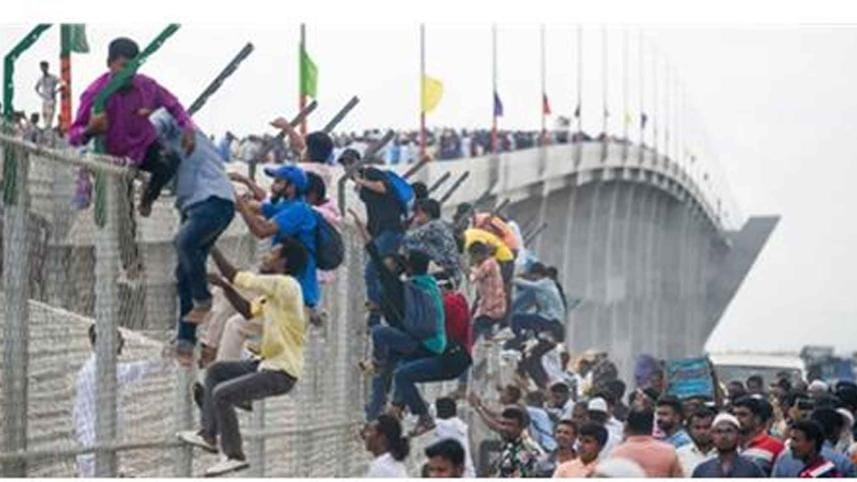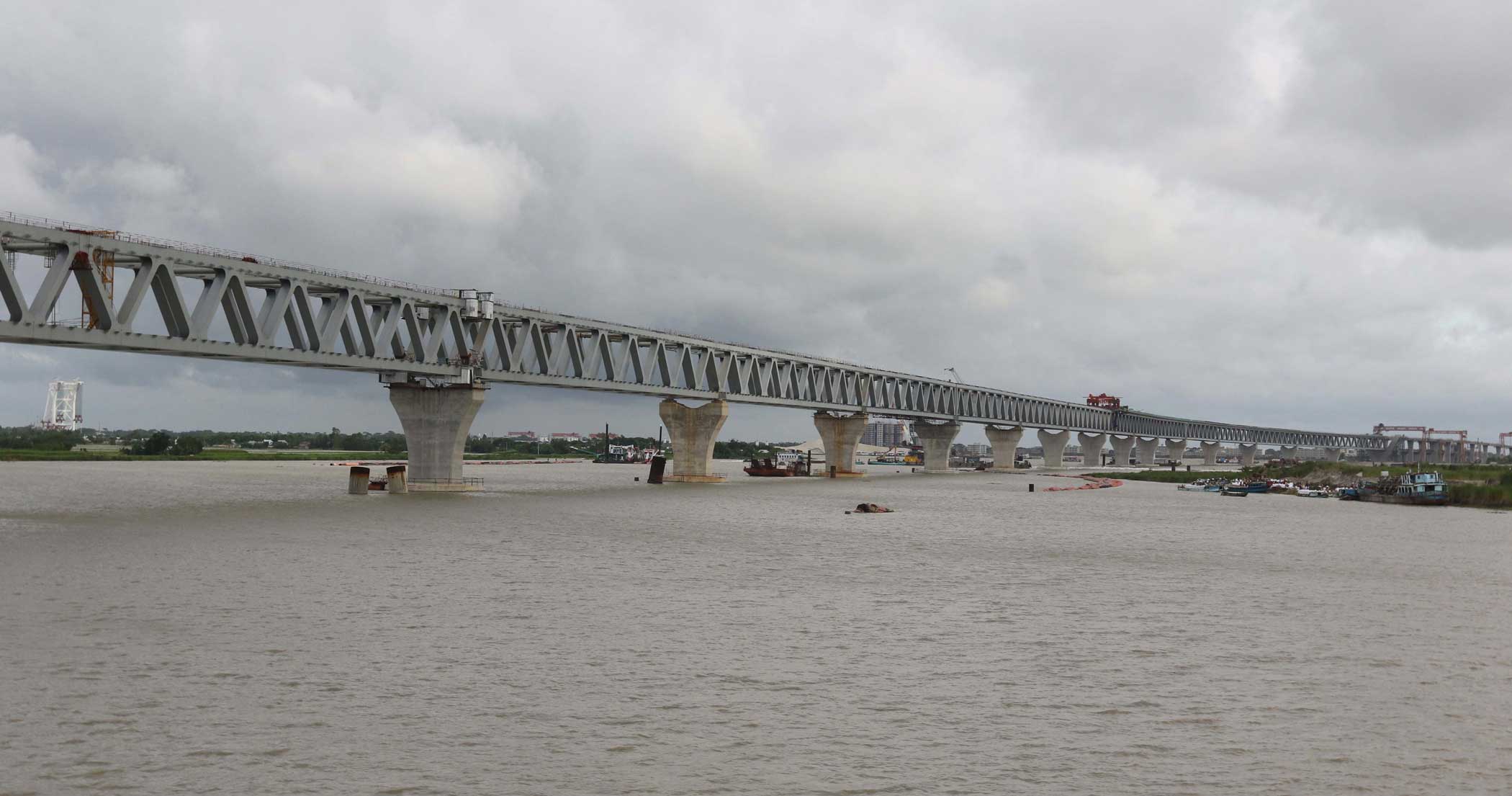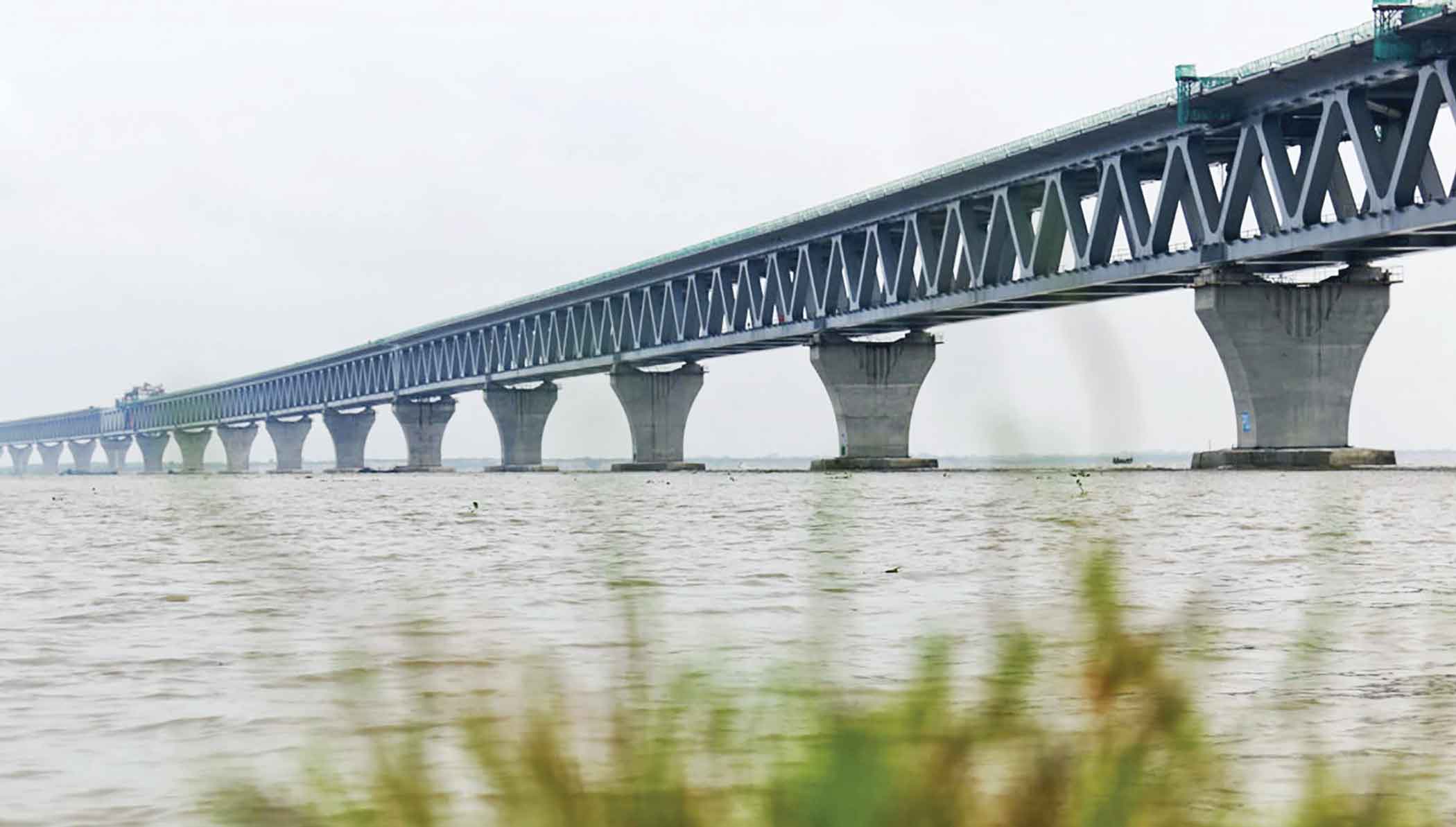Celebrating Padma Bridge: A people starving for public spectacle

The first couple of days of the Padma Bridge's opening was chaotic, hilarious, tragic and outright ridiculous.
As I was rummaging through social media, and listening to the interviews that our colleagues from Munshiganj sent, I saw – as I guess almost all of us did – grotesque renditions of absurd actions from typical Bangladeshis.
Despite all of these being illegal and dangerously unsafe, they broke fences, they stopped and got off everywhere on the bridge and made TikTok videos doing I-don't-know-what-that-is-even poses. Some even performed namaz. Overspeeding killed two; some urinated on the bridge. Then there was a guy who, after a good beating from the police, said with a broad smile that if he couldn't get onto the Padma Bridge, his heart would've shattered (the original Bangla version "Koilja faitta moirai jaitam" is way funnier). And then there was a 30-something woman saying, "I always saw this bridge on Facebook and TV and everyone in the village was coming here. So, I got into a pickup truck too."
Wait.
I think there's an actual glimmer of awe in the awkward and shy gaze of this woman. This was perhaps an actual experience of a lifetime for her. And, perhaps, inside all of those reckless bikers, rowdy pickup groups, political-bandana troupes, that girl who swam to see the prime minister, and that father-and-son duo with hilarious haircuts, there is a cathartic emotion of experiencing a monumental spectacle.
And, why wouldn't it be such? The Padma Bridge is one of the most magnificent engineering marvels of the modern world – one of the greatest accomplishments of Bangladesh. And I guess no one in this country could remain unaware of each and every step of this megastructure's construction: from the first false accusations and erecting pillars one by one, to the grand opening of the new vital line of our riverine flatland.
So, was it surprising that people swarmed to the Padma Bridge?
Alongside all breeds of media and corporations jumping on board the hype train, and those songs about Swapner Padma Shetu, the government even issued a toll-free service for 18 bridges on the inauguration day of Padma Bridge so that people could easily come to the ceremony.
Was it at all surprising, then, that there would be mayhem on that day? That the crowd would disregard civility and break the law?
Bangladesh is now starving for public spaces and communal experiences. There is an alarming deficit of open theatres, playing fields, parks, lakes – anything recreational where the citizens can visit, create shared memories, spend a solitary evening, and grow a sense of belonging with the community, or even understand the concept of communal good. How can they know that if they do not have the civil decency to take care of public properties, all of us would be affected in the long run?
In Dhaka, and in most of the big cities in the country, this generation has lived the entirety of their lives inside rapid and scattered urbanisation, in absurd concrete labyrinths. The indoors are congested, isolating, barely liveable; and the outside is chaotic, filthy, and life-threatening. There's scarcely any place to take an idle breath, enjoy the moment, and have an anxiety-free engagement with the environment. Living here means scavenging, annexing whatever one can find.
Encounters with the community mostly result in interpersonal power negotiations, or what I'd like to call a "hedam culture." Suppose, you are to cross the road; in that very moment, a car and you enter in a hedam show-off of who has the stronger guts. If you have more hedam, the car will (hopefully) stop to let you cross, and if you don't, well, forget about ever crossing the road (or please take the nearest foot overbridge if there's one around).
This phenomenon is present in all aspects of our society – urban and rural. The laws seem different if you have a big car, are a powerful person or even pretend to know someone in the government. If you have bribes to offer, you are exempted from hassles. If you have political affiliations, you can beat up someone or secure a bed in the hospital. The mass never encountered absolute universality of law, and many distrust the law enforcement.
So, in this context, would it be surprising if the people regarded regulations as challenges to conquer, rather than as acts of communal duty?
They felt triumphant on the Padma Bridge after they elbowed ahead of the crowd, outran the police, ran across the road between two swishing trucks, completed an overtake, did not wear a helmet, unbolted some nuts, sneaked in without paying toll fees, and so on.
Then there's those TikTokers and social media addicts. Is it normal whatever in this bizarre world they were doing? Well, to a surprisingly great degree, yes. The world is now finding new realities and new connections in the virtual realm. Under surveillance capitalism, with powerful devices in hand, and wondrous algorithms controlling our thoughts and actions, the youths have become virtual citizens. And every part of the world is trying to make sense of this whirlwind. (And governments, celebrities and companies are jumping on this train, because now here's where the money, data and power is.)
Especially in our society, where physical spectacles are non-existent and public spaces are repulsive, youths are leaning more towards the communities in the virtual world that taps into their fantasies for extreme machismo, the ultimate hedam, the hoarded extravagances, the grand spectacles. And they, too, crave for a spectacular place to shoot a video.
And the Padma Bridge is one of the very few physically grand spectacles in this country. Of course, Padma Bridge is a functional structure, not a tourist destination. But how many non-functional megastructures do we have in our country? And functional or not, this bridge is euphoric to stare at, to go across. And through this mere functional structure, millions of lives will be changed. Even Durga and Apu came to see the new rail track in Pather Panchali, or those Dhakaiyas in the photograph from the 70s who went in hundreds and just stood there on a foot overbridge because it was something new.
I'm not saying everything that people did on the Padma Bridge is acceptable, nor is the way this society is functioning. But did the two days of madness come out of the blue? We all knew. We were waiting for something to laugh at, something to gasp at, something to ridicule. And we felt triumphant saying, "I told you so!", "Typical (uncivilised) Bangladeshis!"
When we say something like "typical Bangladeshis," we somehow place ourselves in a higher position – like we are not typical Bangalees, we are civil, we have common sense, we'd never do that. They did that. They are ridiculous. This is the narrative that almost all those who hold credibility in our society put out, or at least cradle inside: journalists, policymakers, online celebrities – the educated bunch. With this, we are negating the voice and experience of the majority of the population. But have we ever thought that, if the law, the civilised narrative, the streets, the city, the new Padma Bridge alienates them, if beating them is a public spectacle, if ridiculing them is a national event, then they would, too, regard all things "civil" as alien, as not-their-headache, or at least an entity to struggle against?
I confess that I, too, am using this "us-and-them" dichotomy. Let's be honest – the majority of the readers of this article are privileged; we are civil, we know what dichotomy or grotesque means (or at least have the sense to Google it); we don't do these unmindful activities; we keep our air-conditioned offices clean. We don't flock to Padma Bridge in extreme heat and sweat. We go to restaurants where the interiors are nice, maybe to a tourist destination or a foreign country. (Except when some Marvel movie is released or a new branch of Domino's opens. Then it's worth going crazy.)
But if we, and I'd like to believe the organisers, had the slightest hunch that this kind of chaos could have happened, that there'd be TikTokers trying to make videos, that people would never completely maintain the law on their own, why is it only them who are persecuted, ridiculed, or held accountable?
All of these could have been taken into account; there could have been a drive to effectively create awareness, make people understand the situation and maintain regulations accordingly, and of course facilitate the need for a public spectacle. But were these addressed properly?
The Padma Bridge is one of the firsts of many functional megastructures to be opened to the public in the next few years. Maybe next time, instead of laughing at the situation, we can refrain from reducing the people to mere objects of ridicule, and try to understand why this is happening.
Naimul Alam Alvi is senior production executive in Star Multimedia.



 For all latest news, follow The Daily Star's Google News channel.
For all latest news, follow The Daily Star's Google News channel. 

Comments